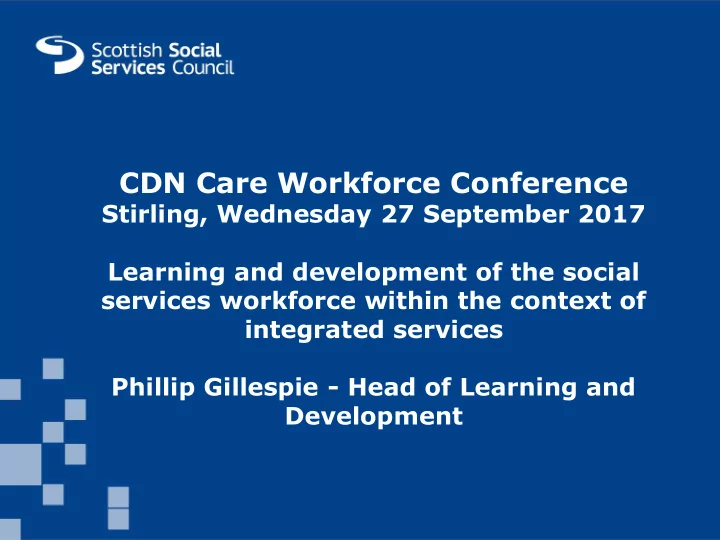

MAIN HEADER GOES HERE CDN Care Workforce Conference Bullets and body text here. • Stirling, Wednesday 27 September 2017 Learning and development of the social services workforce within the context of integrated services Phillip Gillespie - Head of Learning and Development
About the Scottish Social Services Council The Scottish Social Services Council (SSSC) is the regulator for the social service workforce in Scotland. The SSSC, • Registers social service workers. • Promotes and regulates the learning and development of the social services workforce . • Can investigate and take action (fitness to practise) where people fall below the standards of practice and conduct.
Workforce Data • Workforce of approximately 200,650. • Majority of employers small – medium sized. • Housing Support/care at home/care homes for adults/day care of children (3 largest sub sectors). • Stability index 78%. • Qualifications based workforce registration. • Diverse workforce covering a range of statutory/independent/voluntary sector. • Workforce Data Report - http://data.sssc.uk.com/data-publications/22- workforce-data-report/157-scottish-social-service-sector-report-on- 2016-workforce-data
Qualifications, standards and the NOS: how this aligns/supports integration SSSC hold a qualification based register and use Scottish Credit • and Qualification Framework to set out levels of complexity of function. SSSC’s role in the development of occupational standards is set • out in the Regulation of Care Act. Sector Skills Council (SSC) for Social Services in Scotland. SSC • function is carried out in partnership – Skills for Care and Development (SfCD) (4 country partnership). National Occupational Standards (NOS) form the basis for • vocational qualifications and apprenticeships used by the social service sector. They describe the knowledge, values and behaviours to be demonstrated by a worker within a given function.
National Occupational Standards NOS are ‘owned’ by the SfCD partnership and developed with • employers to reflect range of functions within the sector. The largest group of NOS are within the Health and Social Care • group of standards. They are developed in partnership with the health sector skills council – Skills for Health. The group of NOS integrates both social services and health • related activity. They range from support worker function up to manager function. The range of NOS can be found using the following link • http://learn.sssc.uk.com/nos/.
Health and Social Care delivery plan Supporting people to live longer, healthier lives at home or in a homely setting and an integrated health and social care system that: focuses on prevention, anticipation and supported self- • management; focuses on care being provided to the highest standards of • quality and safety, whatever the setting, with the person at the centre of all decisions; and ensures people get back into their home or community • environment as soon as appropriate, with minimal risk of re- admission.
Neighbourhood models of care Freedom, responsibility & integration at point of care
Neighbourhood models of care: Test Sites 8 test sites in Scotland Shared Principles Promoting independence and self-management • Continuity of support and worker – reduce fragmentation • Self organising, flexible teams focused on people • Back office/organisation focused on staff and people • Opportunities - accelerating integration at point of care, • empowering nursing and social care workforce Changing commissioning practice • •
Work based qualifications that support HSCI and registration requirements Data from Scottish Qualification Authority and Skills Development Scotland • indicate that the qualifications and apprentice frameworks used by the social service sector are well used. Modern Apprenticeships account for around a quarter of total SVQ activity. Registration requires that certain categories of workers gain particular • qualifications (including SVQs) to obtain or maintain registration with the SSSC and therefore continue to practise and work in the sector. Categories of worker are defined within the Regulation of Care Act. Joint work/learning between social service and health – Palliative and End of • Life Care/Promoting Excellence/Learning Technology. Integrated career pathways – will support workforce planning at national and • local level. Shared value base – Codes of Practice (CoP) to support individuals maintain • own professional CoP within an integrated service. http://data.sssc.uk.com/images/publications/svq/SVQs-Report-2015-16_FINAL.pdf
Opportunity – An Integrated Workforce Integration is requiring partnerships to develop new operating models to • achieve the outcomes for local communities. Regulation needs to respond to new models of care to achieve a • sustainable workforce for the future. Workforce development programmes need to • ➢ Equip and sustain the workforce and partnerships for system change. ➢ Accelerate learning and development collaboratively at local and national levels. ➢ Test new models of care (clinical and care governance). ➢ Qualifications and standards meet the needs of learners and employers ➢ Resources support professional development of the workforce.
Developing a suitably skilled workforce is crucial to the success of • integrated health and social care services ... This is particularly challenging, given the wide range of people involved and the size of the workforce.” “There will be implications for the skills and experience that staff will need • to deliver more community-based support as services change ... Developing and implementing workforce strategies to meet these needs will be challenging.” (“Health and social care integration”, Audit Scotland, 3/12/15 pp. 33 – 34)
Thank You
Recommend
More recommend